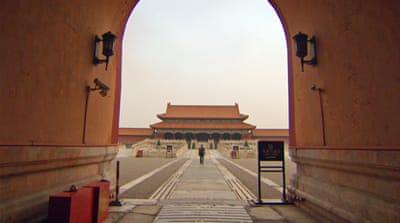Part 1 Another World
In Marco Polo's footsteps: from Venice to the Holy Land,
through the Middle East to the home of the assassins of Alamut.
A childhood fascination with the Italian explorer became a lifelong passion for Professor Qiguang Zhao, a teacher of Chinese culture, who travels to Venice to chase the 'shadow' of Marco Polo. While seeking out the Marco Polo story, he contemplates the meaning and implications of a westerner discovering the East back then and asks what resonance that has for the world today.
While the professor remains in Venice, searching the libraries and old buildings for clues to the meanings of the Marco Polo story, a young man from Venice, of similar age to the Marco Polo of 1271, sets out to replicate the physical journey, quoting from Marco Polo's various written accounts. Through narration, the quotes from Marco Polo's books and the contemplations of Professor Zhao, the episode builds a picture of the first part of the journey.
Marco Polo’s book. How many times have I read it? So many, I cannot remember. What an influence he’s had on me. Even when we were forbidden ... to read foreign books, I couldn’t let him go.
|
The first stage of the journey arrives in the port of Acre, a disputed place then and still today. Currently in Israel, Acre back then was medieval Europe's last toe-hold in Asia, caught up in conflict between Christian crusaders and Muslim armies, with the Mongols biding their time nearby. In a local cafe we meet today's Arab residents of Acre, who reflect on how they have always been caught between two worlds here.
From there, Marco Polo went on to Jerusalem, carrying letters from the Pope for the Mongol ruler Kublai Khan. He collects holy oil from the Holy Sepulcher to take to the Mongol leader.
Travelling north and east he moves into present day Iraq. The journey was dangerous then, as it is now. The brutal siege of Baghdad had happened some years earlier in 1258, devastating one of the greatest cities in the world. Today, we meet refugees from the 2003 devastation of Baghdad, some 700-plus years later, who reflect on the troubles their homeland and home city has endured.
Marco Polo skirts the dangerous Baghdad and travels towards present day Iran, then already controlled by the Mongol Empire. Here Iranian scholars of today explore the Persian influence on Marco Polo's records and his understanding of the East.
Marco Polo also hears the story of 'the old man of the mountains' and the assassins of Alamut. An Iranian archeologists and a local hunter, who lives beneath the ruins of Alamut, lend their own perspective to the story of the assassins and contemplate Eastern and Western views of martyrdom.
"On the subject of martyrdom ... an eastern person would not do it for money or any other type of material gain. It is deeply embedded in eastern culture. People will even sacrifice their lives for their beliefs," says Dr Hamideh Chubak from the Alamut Research Center.
The film concludes back in Venice, where the professor pages through the ancient scripts of the Marco Polo's tales, dictated to ghost writers over the years, each adding their own interpretations.



No comments:
Post a Comment